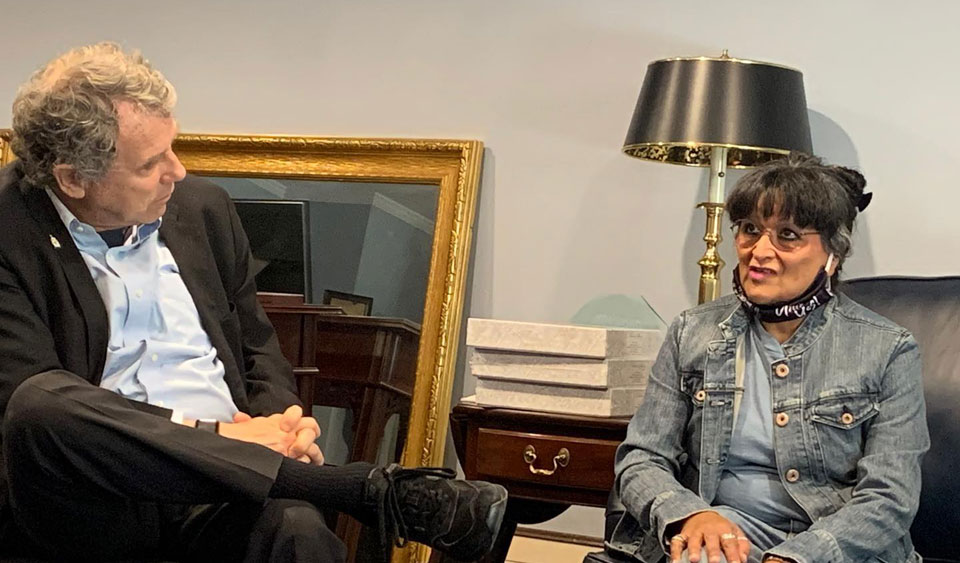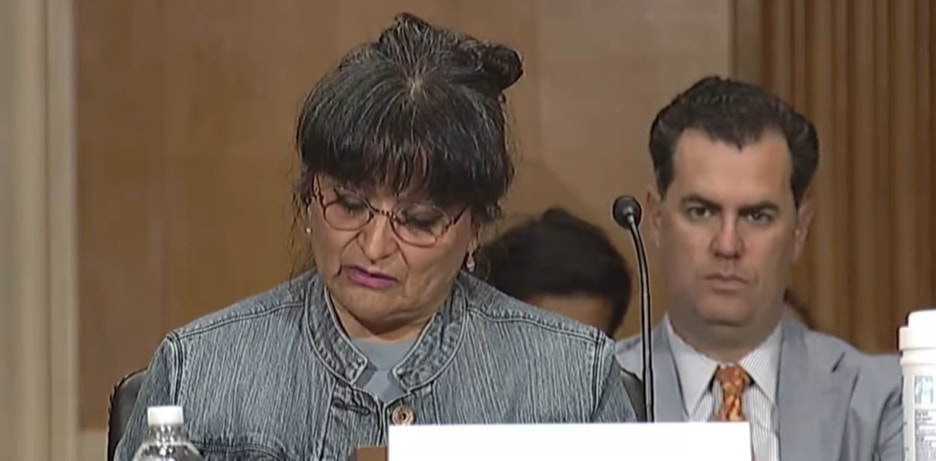|
Gracie Heldman, who struggled 20 years to form a union at Hearthside Foods in Ohio, tells her story of Democratic Sen. Sherrod Brown. She told him of a co-worker who committed suicide. | BCTGM McCOMB, Ohio—For 20 of the 33 years she’s worked at Hearthside Foods, an industrial bakery in McComb, Ohio, that turns out cookies, crackers and candy bars for big firms such as Nabisco and Kellogg’s, Gracie Heldman has campaigned for a union—specifically the Bakery, Confectionery and Tobacco Workers and Grain Millers—there. Three times in 20 years, Heldman and her pro-union colleagues collected enough signed National Labor Relations Board union election authorization cards to demand a vote at the 1,200-worker plant. Once, they got 65% of workers to sign up. Hearthside brought in union-busters. It forced workers to attend anti-union harangues in one-sided “captive audience” meetings, under pain of discipline if they didn’t. Once, Hearthside illegally fired seven union supporters. During another drive, it even threatened, also illegally, to close up shop if the workers went union, Heldman told senators on July 22. The bullying, intimidation, harassment, labor law-breaking and interrogation by union-busters or supervisors while workers were on the job succeeded. Enough people got scared, especially by the firings, that when the votes occurred, after drawn-out anti-union campaigns by the bosses and their “consultants,” BCTGM lost. Heldman brought her story, which is typical of what happens to workers during organizing drives, to the Senate Labor Committee’s hearing on the Protect The Right To Organize (PRO) Act, the wide-ranging pro-worker labor law reform. It would outlaw such abuses, force the union-busters’ shady practices into the open, and do much more. Democratic senators on the evenly divided panel gave Heldman and other pro-worker witnesses—former NLRB Chairman Mark Gaston Pierce of Buffalo and Economic Policy Institute Policy Director Heidi Shierholz—a sympathetic hearing. Not so the Republican senators, even though a new Hart Research poll shows a plurality of rank-and-file GOP voters (45% for-40% against), including a plurality of Trumpites (45%-41%), back the PRO Act and its goals. The poll’s overall national margin for the PRO Act is 63%-25%. Democrats supported it by an 87%-6% score, and independents clocked in at 60%-26% in 4,114 calls stretched over the nine states it covered. Scores were almost as lopsided in those “battleground” states, too. Besides making it easier to organize, the PRO Act would negate so-called “right to work” laws, increase fines for labor law-breaking, and legalize card-check recognition when unions present signed NLRB election authorization cards, independently verified, from a worker majority. It also forces union-busters and their spending and clients into the open. And it mandates binding arbitration when bosses won’t bargain a first contract. Heldman described the obstacles workers face to unionizing. She also gave a simple summary of why workers want unions—which, other polls show, a majority do. In a simple phrase, to protect themselves, not just against bosses’ labor law-breaking, but against rampant corporate exploitation and abuse. Sen. Sherrod Brown Facebook page “The hours are long” in the 24-hour-a-day seven-days-a-week plant “and the pain can be really bad, especially in your wrists, shoulders and back,” in an industrial bakery, she said. “The company doesn’t take health and safety seriously so it’s not really surprising the McComb bakery has been cited by OSHA (the federal Occupational Safety and Health Administration) many times and is one of the worst offenders in Ohio. That was one of the main reasons so many of us have wanted to join the Bakery Workers since the late ‘90’s. “We have been overworked, we’ve been injured on the job, disrespected by supervisors, and forced to work in bad conditions. We wanted a union to help protect us while we were at work, to give us a say about the conditions we had to work under, and to help us get just a little bit of respect from our bosses.” What they got instead was surveillance, one-sided “captive audience” meetings, closure threats, bosses’ legal stalls and election delays and illegal firings of seven pro-union workers after the second campaign in the early 2000s. That was so scary to other workers that BCTGM lost even after 65% of workers initially signed election authorization cards. At least Heldman is still alive. Northern Virginia Labor Federation President Virginia Diamond reported that in a July 21 meeting with top staffers for undecided Democratic Sen. Mark Warner, Laborers Local 572 member Sonia Luna told of one worker who wanted to unionize Didlake, to have a voice on safety and health issues at that Virginia placement company for people with developmental disabilities. Didlake’s union-buster succeeded in helping bosses beat Local 572. The firm’s still non-union. The worker concerned about safety and health is dead, from the coronavirus. Diamond did not say whether the worker caught the virus on the job. The PRO Act would end all those abuses, and more, Heldman said. Had it been in effect during BCTGM’s first drive, two decades ago, the union would have won, she declared. Expert witnesses Pearce and Shierholz backed Heldman’s story with data and details. “It’s no surprise workers want unions,” Shierholz testified. “When workers are able to come together, form a union, and collectively bargain, their wages, benefits, and working conditions improve. On average, a worker covered by a union contract earns 10.2% more in wages than a peer with similar education, occupation, and experience in a nonunionized workplace in the same sector,” she pointed out. Despite that and other union advantages, relentless corporate campaigns over decades have reduced private-sector and overall union density in the U.S. to just under 11%. Private-sector density alone in the 1950s—before establishment of public sector unions—covered more than one-third of workers. “More than nine in 10 workers covered by a union contract (95%) have access to employer-sponsored health benefits, compared with just 68% of nonunion workers,” Shierholz continued. “Further, union employers contribute more to their employees’ health care benefits. And more than nine in 10 workers—93%—covered by a union contract have access to paid sick days, compared with 75% of nonunion workers.” Pearce told senators “core provisions of the National Labor Relations Act have been eroded by overly narrow NLRB and court interpretations which frustrate the congressional intent” that led to the NLRA. Pearce, a former NLRB attorney, board member and chair added that in the last four years, the GOP majority named by former Oval Office occupant Donald Trump undertook “an all-out assault on (union) access to workers. “The right to engage in protected concerted activity withered away over decades of judicial attack and the policies of labor hostile NLRB majorities. From 1980 until its recent 2018 temporary spike, the worker’s statutory right to strike over working conditions and for mutual aid and protection has been curtailed almost to the point of ineffectiveness,” he elaborated. One key reason: An early Supreme Court decision, that let bosses hire scabs—officially “permanent replacements”—for workers forced to strike for economic reasons. And the Trump majority made it easier for bosses to misclassify workers as “independent contractors,” unprotected by any labor laws, including the NLRA, he said. As witnesses testified to the Senate panel, unions continued their nationwide campaign to convince reluctant lawmakers to pass the PRO Act (see separate stories). Their targets include two recalcitrant Democrats: Virginia’s Warner and Arizonan Kyrsten Sinema. The Hart Poll shows pro-PRO Act majorities in both states: 65%-22% in Virginia and 59%-25% in Arizona. Non-union voters back it 61%-27%, the survey adds. Warner, for one, is keeping silent, Northern Virginia Labor Federation President Diamond told the Metro DC Central Labor Council’s news website. Besides Luna’s story about the pro-union worker at Didlake, “Alfonzo Clements, a DASH bus driver from Amalgamated Transit Union Local 689, described how the 16-year campaign to unionize his bus company succeeded in lifting him and his co-workers out of poverty and into the middle class through collective bargaining,” Diamond reported. “Despite these stories, Warner’s staff indicated Warner is still not willing to co-sponsor the PRO Act.” Unite Here President D. Taylor hit the same safety and health theme Luna did. “The Covid-19 (coronavirus) pandemic has made clearer than ever the critical difference belonging to a union can make, especially for workers of color and women, who have been among the hardest hit by loss of life, health, and employment this last year,” he says in an electronic petition. “That’s why we need the PRO Act.” AuthorMark Gruenberg is head of the Washington, D.C., bureau of People's World. He is also the editor of Press Associates Inc. (PAI), a union news service in Washington, D.C. that he has headed since 1999. Previously, he worked as Washington correspondent for the Ottaway News Service, as Port Jervis bureau chief for the Middletown, NY Times Herald Record, and as a researcher and writer for Congressional Quarterly. Mark obtained his BA in public policy from the University of Chicago and worked as the University of Chicago correspondent for the Chicago Daily News. This article was republished from People's World. Archives July 2021
0 Comments
Leave a Reply. |
Details
Archives
July 2024
Categories
All
|


 RSS Feed
RSS Feed